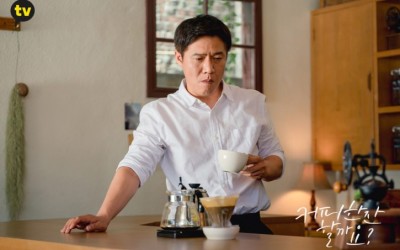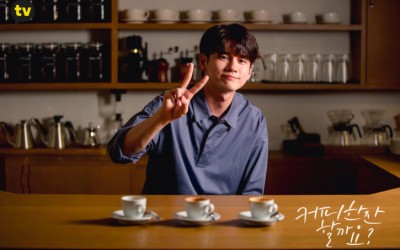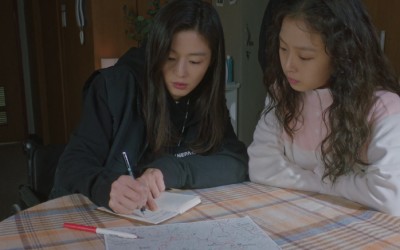Recap "Would You Like A Cup of Coffee?" Ep 7
Aside from word-of-mouth praises from customers, businesses thrive from the popularity gained from critic reviews. This episode sheds light on perceptive businesspeople who take their passion more seriously than profits. A perfect example is Park Seok who shares his coffee with people who need its soothing magic in their lone time – or with the company of other people for good times.
Hosting a free taste for his regular customers, Park Seok surprised the tasters about the coffee beans that he let them taste were roasted two weeks ago. In coffeemaking, freshly roasted beans are essential ingredients to guarantee great coffee. Thus, it was an interesting coffee chat for the group to learn the roasting and storage factors that could affect the taste of coffee.
Joo-hee mentions the popular coffee critic who prioritizes data over experience in considering coffeemaking variables. His name is Choi Heart. Just as they talk about his missing presence lately, he enters the cafe to get a taste of the coffee, the regulars posted on their SNS.
However, a trio of modern coffee reviewers also invites themselves inside. The overly passionate critic starts lecturing them about how inexperienced they are about coffee to have the audacity in generating feedback.
After the customers step out because of the weird man lecturing them, Gobi confronts his overconfidence. He challenges him to comment on the coffee he would brew. Bluntly declaring his coffee does not deserve his comments, Gobi follows behind to give him the remaining coffee with a sticky note instruction.
The next day, Choi Heart arrives early at the coffee shop to praise Park Seok’s strange but good rookie barista.
Watching Would You Like A Cup Of Coffee has truly made me realize how little I know about coffee brewing. Its intricate and scientific methods, made my respect for baristas heightened.
This week, variables in running a business were highlighted. Park Seok who was making an experiment in coffee roasting and storage was reminded of how to smartly convert gaps to opportunities.
Likewise, Gobi who is working on a goal was taught to engage in the trial process to gain experience and not the other way around. Fortunately, he met the perfect person to get a sound experience.
“A critic is not a bully.”
Like what Gobi said to Choi Heart, those who are deemed eligible to make constructive criticism to influence people should always be “responsible” and “respectful”. In a way, I can relate to Choi Heart. His passion to commit to honest reviews is commendable. However, the approach is lacking as he forgets how we are all peculiar individuals with varying preferences.

My early years of reviewing dramas were technical and barely tolerant to badly-executed series. It took me a while to develop being consistently objective, something that comes in handy for every reviewer.
Watching and reviewing dramas for almost 20 years made me realize that sticking to a set parameter while understanding the target audience of the drama is an important thing to consider when writing insightful K-Drama recommendations.
Delivering opinions courteously is paying respect to the people behind any drama production even when the story does not appeal to the general audience.
If in case you are keen to thread on the journey of becoming a product or service critic, make sure to back it up with sufficient knowledge and years of personal experience.
At present time, everyone has the liberty to criticize, but there could not be enough Gobi to remind us to stay grounded and polite.

Other Articles
-

Recap "Would You Like A Cup Of Coffee" Ep 9
-

Recap "Would You Like A Cup of Coffee?" Ep 8
-

Recap "Would You Like A Cup of Coffee?" Ep 6
-

Recap "Jirisan” Episode 9
-

Recap “Jirisan” Episode 8
-

Recap "Fall In Love" Episode 15
-

Recap "Fall In Love" Episode 14
-

Recap "Fall In Love" Episode 13
-

Recap "Fall In Love" Episode 12
-

Recap "Fall In Love" Episode 11
-

Recap "Fall In Love" Episode 10
-

Recap "Fall In Love" Episode 9
Genres
- Accident
- Action
- Adventure
- Alien
- Amnesia
- Ancient legend
- Animals
- Animation
- Arthouse
- Artificial Intelligence
- Award Winning
- Based on a Comic
- Based on True Story
- Betrayal
- Biography
- BL
- Bodyguard
- Bromance
- Business
- Chambara
- Childhood
- Christmas
- Cohabitation
- Cold Man
- Coma
- Comedy
- Concert
- Conglomerate
- Conspiracy
- Contract Relationship
- Corruption
- Crime
- Criminal
- Curse
- Dance
- Deity
- Demon
- Detective
- Disability
- Disaster
- Documentary
- Drama
- Eastern
- Educational
- Entertainment
- Environment
- Erotica
- Espionage
- Exorcism
- Exploitation
- Fairy
- Family
- Fantasy
- Fashion
- Feminism
- Food
- Foreign
- Friendship
- Game Developer
- Gangster
- Geishas
- Gore
- Goryeo Dynasty
- Grudge
- Gumiho
- Harem
- Hidden Identity
- Historical
- Horror
- Hostage
- Human
- Hypnotism
- Idol Drama
- Indie
- Instructional
- Investigation
- Jidai Geki
- Josei
- Kidnapping
- Kung Fu
- Law
- legal
- Lesbian
- LGBTQ+
- life
- Love Triangle
- Mafia
- Magic
- Manga
- Manhua
- Martial Arts
- Mature
- Medical
- melodrama
- Mermaid
- Military
- Miniseries
- Misunderstanding
- Monster
- Murder
- Music
- Musical
- Mystery
- Mythology
- Nature
- Neighbours
- Noir
- Novel
- Omnibus
- One shot
- Parody
- Phobia
- Poison
- police
- political
- Power Struggle
- Prison
- Professional
- Programmer
- psychiatry
- Psychological
- Reality
- Reality Show
- Reality TV
- Rebellion
- Religion
- Remake
- Republic
- Resurrection
- Revenge
- Rich Man
- Robot
- Romance
- RPG
- Rural
- Samurai
- Scholar
- School
- Sci-fi
- Seinen
- Serial Killer
- Short
- Sismance
- Sitcom
- Slapstick
- Slice of Life
- Society
- Soulmates
- Sports
- Supernatural
- Survival
- Suspense
- Swordsman
- Taiga drama
- Teamwork
- Tearjerker
- Teen
- Terrorist
- Thief
- Thriller
- Time Travel
- Tokusatsu
- Tomboy
- Tragedy
- Tragic Past
- Transmigration
- Trauma
- Treason
- Triad
- Underworld
- Unrequited Love
- urban drama
- Vampire
- Variety
- Variety show
- War
- Warrior
- Web Series
- Webtoon
- Werewolf
- Western
- Witch
- Workplace
- Wuxia
- Yakuza
- Yaoi
- Youth
- Yuri
- Zombie

